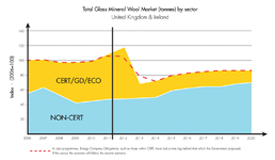

MERSEYSIDE: Knauf Insulation has joined calls for the Government to build on the current Green Deal and Energy Company Obligation (ECO) proposals by aligning the plans with an ambition to insulate all lofts and cavity walls by 2015.
The company has undertaken detailed market analysis, which has forecast a significant fall in the uptake of insulation upgrades once subsidies from CERT – the obligation placed on energy companies to deliver carbon savings – is removed, despite these measures being crucial to the reduction of carbon emissions.
The company has measured the potential impact on loft and cavity wall insulation, particularly in relation to the ‘able to pay’ sector. Under current proposals the Green Deal and ECO will provide no subsidies or incentives to these households to undertake insulation upgrades, even though figures show this potentially represents over 3m conventionally fillable cavities and 9m lofts that can be topped up.
John Sinfield, managing director of Knauf Insulation said: “Our graph illustrates that, despite longer term increases in demand for insulation in the general building market, the lack of focus on lofts and cavities in the funded residential refurbishment market will have a significant impact overall for glass mineral wool. This potential ‘cliff edge’ has massive implications, not just for manufacturers, but also for consumers, installers and the Government.”
Upgrading the thermal efficiency of properties through loft or cavity wall insulation is one of the easiest and cheapest means of reducing energy use and carbon emissions. Cavity wall insulation can save a home 550kg of CO2 a year, whilst installing up to 270mm of loft insulation can save between 110kg and 220kg CO2 a year. Furthermore, to optimise the potential efficiencies of any other method – be it a new boiler or thermostats, new windows or utilising renewable energy sources – any building must first be properly insulated.
John Sinfield continues: “We very much welcome the Government’s commitment to energy saving initiatives such as the Green Deal and ECO – they have the potential to transform the energy efficiency of our housing stock. However, without some additional incentives to drive take-up, our market forecast highlights a drop-off in insulation upgrades, meaning lost carbon savings for Government, and more importantly in these times of increasing energy costs, lost ‘cash’ savings for homeowners.
“Our forecast is based on detailed analysis of both the Green Deal / ECO and the general construction market. Loft and cavity wall insulation will currently not be subsidised for the ‘able to pay’ sector in ECO – CERT’s replacement – with the Green Deal likely to offer the measures only as part of a total package to upgrade a home. This package is likely to include other higher priced measures with the capital cost being placed as a debt on the energy meter. Initial trials have demonstrated that many homeowners are unlikely to take on loans of significant value, meaning the opportunity to achieve the ‘easy wins’ ie, loft and cavity wall insulation upgrades will be lost.
“The Green Deal and ECO in their current form offer no real incentive to upgrade loft and cavity wall insulation for the ‘able to pay’ sector yet require the insulation industry to manage the transition between straightforward insulation measures to the harder to treat solutions overnight. This approach will damage insulation industry capacity, miss out on significant low hanging fruit and ultimately impact on Government’s low carbon ambitions for the residential sector.
“Instead, cavities and lofts will only be eligible for subsidised insulation under the Affordable Warmth portion of the ECO, which runs the risk that the measures may actually increase not decrease fuel consumption, as they may only result in residents being able to now heat their homes to sufficient comfort levels not previously achieved.
"We therefore back the recommendation of the Commission for Climate Change and hope that the upcoming consultation on Green Deal / ECO will show support for other measures to drive early adoption, such as stamp duty concessions, council tax rebates and VAT changes.”